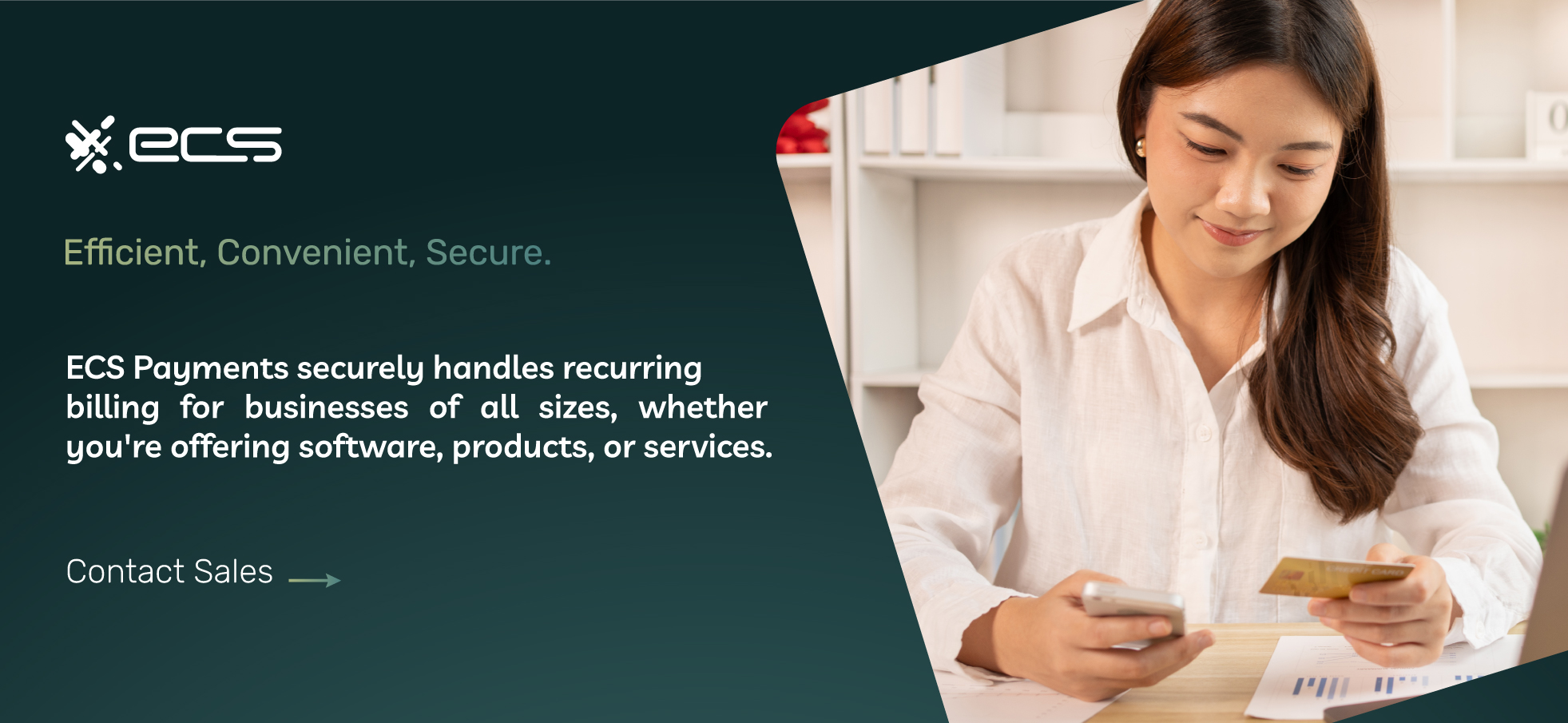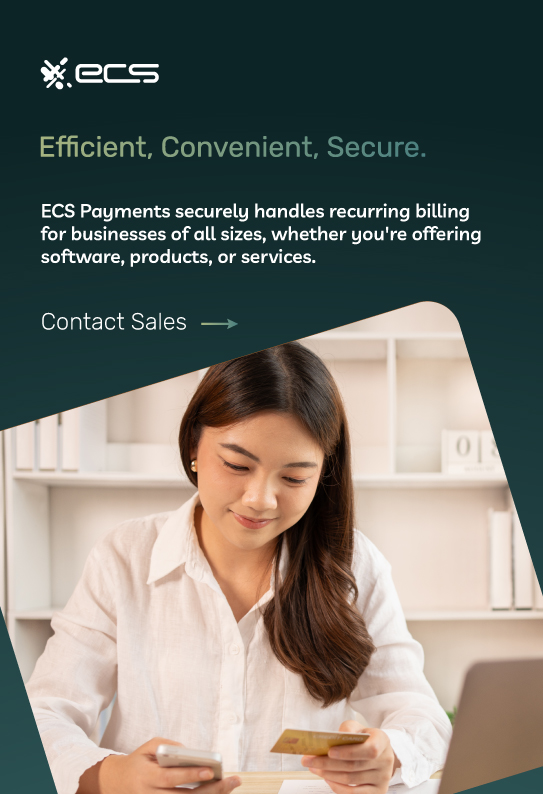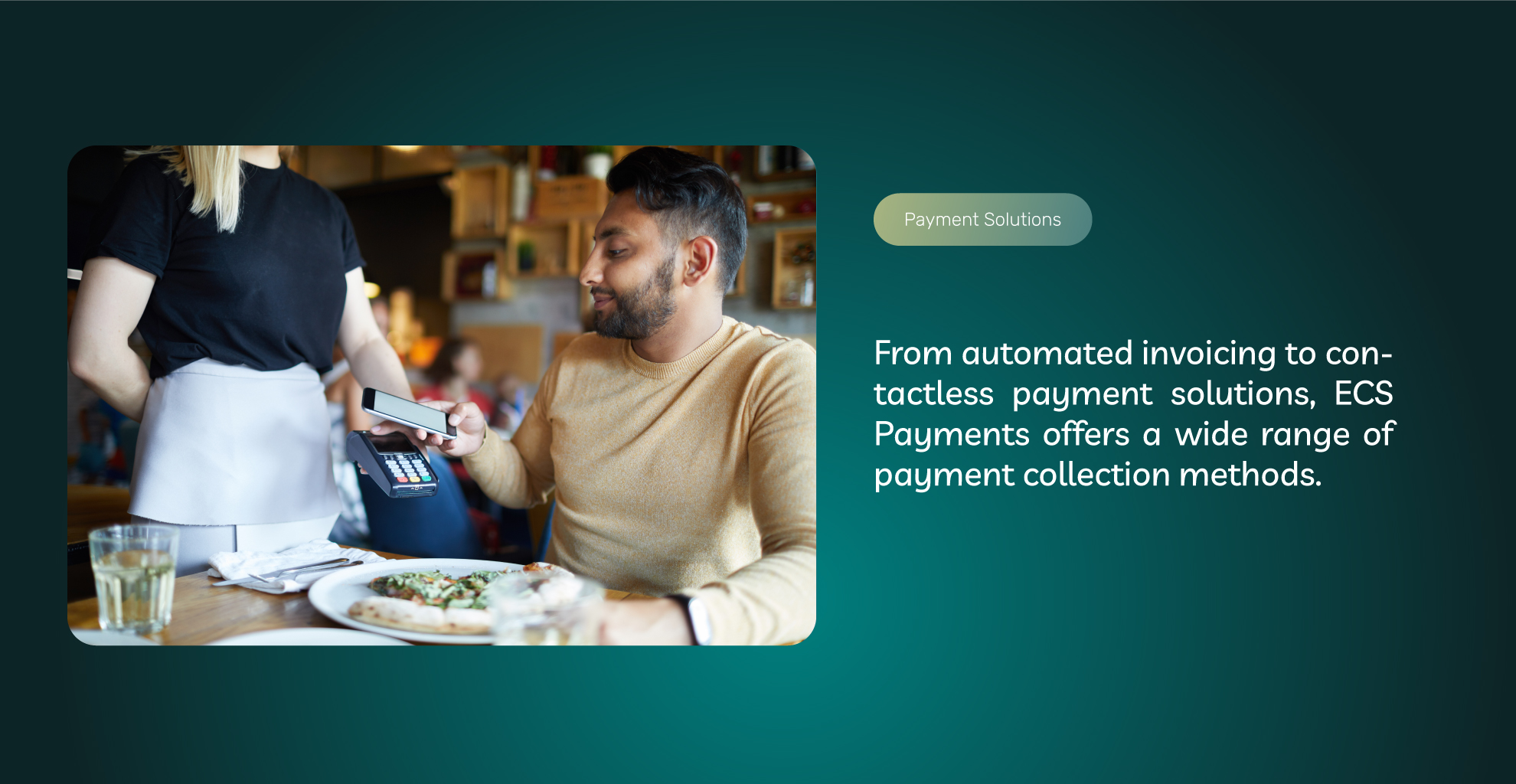Do you hate the idea of chasing down overdue payments? Or customers abandoning their cart because you don’t take their preferred payment method? Fortunately, there are many easy ways to collect payments. Check out some of the ways ECS can protect your cash flow with robust and efficient payment collection:
Online Payment Portals
Not every business is a brick-and-mortar. Some businesses are exclusively online. There are over 26.2 million online businesses worldwide, with 13 million alone in the United States. Many businesses rely on big-name players like Shopify, Woocommerce, and PayPal.
These large payment aggregators are fine for very small businesses just starting out. But as soon as a business accelerates to a normal sales volume, the pricing schemes of these big-name players become burdensome. The lack of nuance to charging every transaction 2.6% plus change will cost a lot of money over time.
Many online-based SMBs do not even consider that better pricing could be out there. Those who do, often throw in the towel. But, working with an independent payment processor can often yield much better rates that benefit your bottom line.
The future of customer payment collection methods will also include crypto and biometric payments. Mastercard, Visa, and Amazon have already rolled out facial and hand recognition tech for processing payments.
These are among the safest and easiest ways to collect payments. But they are also very cutting-edge. Is your payment processor ahead of the curve with this one?
ECS payments can facilitate online payment gateways for e-commerce and even brick-and-mortar businesses that want an online presence. A demonstrable “halo effect” shows that brick-and-mortar stores with an online presence see sales increase in both areas.

Mobile Payment Solutions
Mobile payments can refer to “on-the-go” payment processing, like turning a smartphone into a card reader. It can also refer to customers making payments with their smartphones. It could even refer to both! Imagine a vendor at a festival or sporting event collecting payments by bumping smartphones with the customer.
Mobile payments are becoming indispensable in certain industries, especially when customer relationships are themselves, mobile. Any type of home contracting service (electrician, plumbing, HVAC, pest control) will have a much easier time collecting payments and streamlining accounts receivable with accounting. That’s because the software that facilitates credit card transactions on-site integrates with accounting, inventory, and other systems.
For businesses in a fixed location, customers prefer the contactless mobile payment option. Around 73% of 2,000 polled consumers have heard of or use mobile payments to make purchases. 72% of these consumers were Millennials or Gen Xers, showing an acceleration of this tech adoption among younger customers.
Whether your business operates from a fixed location or you own a fleet of service vehicles, ECS Payments can offer mobile payment options. Although the general idea of mobile payment tech is similar across the board, each industry will have specific requirements, challenges, and software integrations that must be addressed.
Automated Payment Systems
Some of the technology we have touched on relies on automating payments, such as subscriptions. Real estate, tuition-based education, and utilities are other paradigms that rely on automated payments. To automate payments, you need to retain customer card information to periodically process the payment.
However, collecting and storing debit and credit card information for subscriptions is not so simple. Businesses must follow many rules and regulations set forth by banks, such as Visa and MasterCard. If any of these protocols are violated, it can result in a bank or card and not work refusing to work with you.
Many of these rules and regulations are not directly related to the payment processing itself but to the layers of security around it. For instance, some rules and regulations set parameters around your Wi-Fi networks, hardware, and employee access.
These standards, called PCI DSS compliance, are expensive to meet. Auditing alone can cost tens or even hundreds of thousands of dollars. You can avoid all these expenses by relying on your payment processor to collect and store the card information. ECS payments can help.
Electronic Invoices and Billing
Not every business collects payments at the point of sale. B2B suppliers, like wholesalers and manufacturers, often bill through invoices. Invoicing is an inherently more complicated method of collecting payments because it may offer the buyer terms like Net-30 or 2/10.
What happens if you have different relationships with each of your customers—that is, you’ve offered some customers Net-30, others with better credit Net-60, and still others Net-90? How can you keep track of what payments are due and when? This juggling act becomes impossible if you’re sending paper invoices.
Electronic invoices can eliminate these complications. Moreover, they can integrate with inventory management software, accounting, and CRM. Did you know that the average business owner might spend as many as 120 days per year working on backend tasks like bookkeeping? Moving your invoicing to cloud-based software means more time for running your business, family, or personal interests.
ECS payments can help you migrate your invoicing workflows from paper to digital form. Collecting money for your invoices can be automated to a greater degree, improving your cash flow and significantly reducing bad debt.


Recurring Billing for Subscription Services
Another area where businesses cannot do without payment processing is subscription services. The subscription economy is already massive, estimated at $1.5 trillion. Subscription models are excellent for improving cash flow, and subscription-based businesses have grown 4.6 times faster than the S&P 500.
B2C subscriptions could include goods or services. Names like Netflix and Peloton are recognizable across the US. However, chances are you can also find a way to make your business “subscribable.” The average consumer spend on subscriptions is $273 per month, and some consumer groups (notably millennials) have an average of 17 subscriptions!
Subscription services are also used for the B2B world. In fact, 94% of organizations use cloud-based SaaS (software as a service). This model is inexorably linked with recurring payments. Whether billing software, CRM, ERM, or anything software-based, subscription models have entirely placed one-and-done hardware installation.
Do you have a software startup? Or do you sell bespoke accent pieces or personal care products? Whether you sell products or services, ECS payments has you covered.
Our recurring billing suites allow customers to pay on autopilot. We can help collect credit and debit card info and store it securely according to the latest PCI DSS standards.
Payment Reminders and Follow-ups
Earlier, we touched on invoicing from the perspective of B2B suppliers. The healthcare industry is another industry that almost always involves collecting payments through invoices. Maybe that’s why hospitals alone reported over $50 billion in bad debt as of 2023—and 30% of them had more than $10 million in bad debt.
You might be surprised to learn that a slight majority of bad debt (58%) is from insured patients. Insurance complicates medical billing and the process of collecting payments from patients. Patients are often willing to pay their medical bills if they can. But if they are billed too long after the date of care—as can happen once the provider has navigated the insurance landscape—this bill can fall under the stack of their other financial obligations.
Care providers are allowed to send reminders about collecting payment as long as the patient consents to receive texts and emails. How can you do this effectively if it’s not automated? Even if you’re a practitioner with just a dozen patients or a healthcare system with thousands of them, you need to automate payment reminders.
ECS payments can facilitate text-to-pay, email billing, paper mail reminders with QR codes, and other means of collecting payments in a timely manner. Of course, healthcare is not the only industry that would benefit from payment reminders. However, it’s one example where such reminders have the potential to make a significant positive change.
Offering Multiple Payment Options
Did you know that 59% of consumers will abandon their intended purchase if their preferred payment method is not available? A big part of making a streamlined payment process is giving customers options for payment. In addition to facilitating all four major credit card networks, you may want to offer customers the option of paying by eCheck or ACH.
When it comes to in-store payments, the right kind of hardware can facilitate multiple payment options in real time. Magnetic strips will disappear from cards altogether by 2030, and the card industry will go contactless. Around 16% of consumers already pay for all their everyday purchases with mobile wallets.
In addition to embracing the latest tech, ECS payments can facilitate flexible payments with POS loans and installment payments. Companies like Klarna and Affirm have taken the retail world by storm but also charge merchants 6% or more. You can offer the same flexible payment terms at a much lower price.
Secure Payment Gateways
Payment gateways are primarily used for accepting payments online. They bridge the gaps between the customer’s bank account, your merchant account, and the card networks. As we’ve already mentioned, using large aggregators like PayPal or Stripe (the payment tech behind Shopify) will cost you.
But you can’t settle for something that isn’t secure in the name of savings. You cannot compromise security for price. Thankfully, with ECS payments, you won’t have to do that. We are dedicated to the highest security standards for you and your customers.
In addition to the obvious ethical issues of exposing your customers to fraud and theft, insecure payment gateways can also lead to chargebacks. Chargebacks are when cardholders file a dispute with their bank instead of contacting you for a refund. And chargebacks can wreck your reputation with card networks, even before going beyond 1% of your transactions.
Payment gateway security today cannot be passive. It must be a proactive process of constant testing and probing weak points in the firewalls and defenses. Robust tools like proxy piercing must be available to take down cybercriminals who attempt to hide behind a fake address. ECS payments can shoulder the burden of fighting this multi-front war while you focus on running your business.

Incentives for Early Payments
Let’s return to invoice payment solutions and billing. What if customer payment reminders could be accompanied by incentives for early payment? Early payment discounts can help fortify your cash flow and avoid having to chase after overdue payments.
One of the more popular incentive structures is the 2/10 invoice, which gives your customer a 2% discount if they pay within 10 days. If you send multiple invoices every day, you want a simplified, automated invoicing process. Discounts should be applied automatically once the customer makes their payment.
Automating the incentive process will save time, as you won’t have to field phone calls from customers who need you to manually apply the discount. You can also create more nuanced discount structures beyond the 2/10, adding several potential “layers” before the Net-30 deadline (or however many days you’ve given). ECS Payments can take the legwork out of setting up these incentives.
Customer Support for Payment Issues
Customer care is a very important part of running a successful business: a 2020 Forbes study found that a whopping 96% of polled consumers would be willing to switch businesses over a bad customer service experience.
What about you, the business owner? Shouldn’t you be provided with excellent customer care? Should you be locked into a business arrangement more than the average consumer just because you have to collect payments?
Not all payment processors are the same. Large companies like Venmo and Stripe (in particular) are notorious for taking days or even weeks to resolve issues. There are horror stories about Amazon merchants being locked out of their own accounts and unable to reach an actual (comprehensible) human on the phone.
ECS Payments is different. We pride ourselves on dedicated account management so you’ll always have a point person to resolve issues quickly. We understand that you cannot run a business while waiting days or hours to resolve payment problems.
Conclusion
From flexible customer billing strategies to secure online payment solutions, ECS payments has you covered. We work with merchants in every type of industry, tailoring our solutions to meet their specific needs and the needs of their customer base, whether it’s B2B, B2C, or both.
ECS payment collection methods span the range of contactless payments, online, automated subscription, card, and ACH payments. Whether you’re taking card payments in-store or sending invoices, we have you covered. Our solutions can integrate with the other types of software you need to run your business, like accounting, CRM, and ERM.
Frequently Asked Questions About Collecting Payments from Customers
You can make payment collection efficient through:
•Online Payment Portals
•Mobile Payment Solutions
•Automated Payment Systems
•Electronic Invoices and Billing
•Recurring Billing for Subscription Services
Whatever your business model, it is best to offer multiple payment options for customer convenience..
Offering multiple payment options increases convenience and therefore, customer satisfaction. It gives customers the flexibility to pay using their preferred method, reducing abandoned carts.
Yes, online payment portals are convenient for customers, even if you do not have an eCommerce operation. Online terminals offer a variety of ways to pay for whatever your industry, healthcare, restaurant, mobile services, etc. You can collect payments with QR codes, payment links, tap-to-pay, and even set up recurring payments if you offer monthly membership options for your services.
